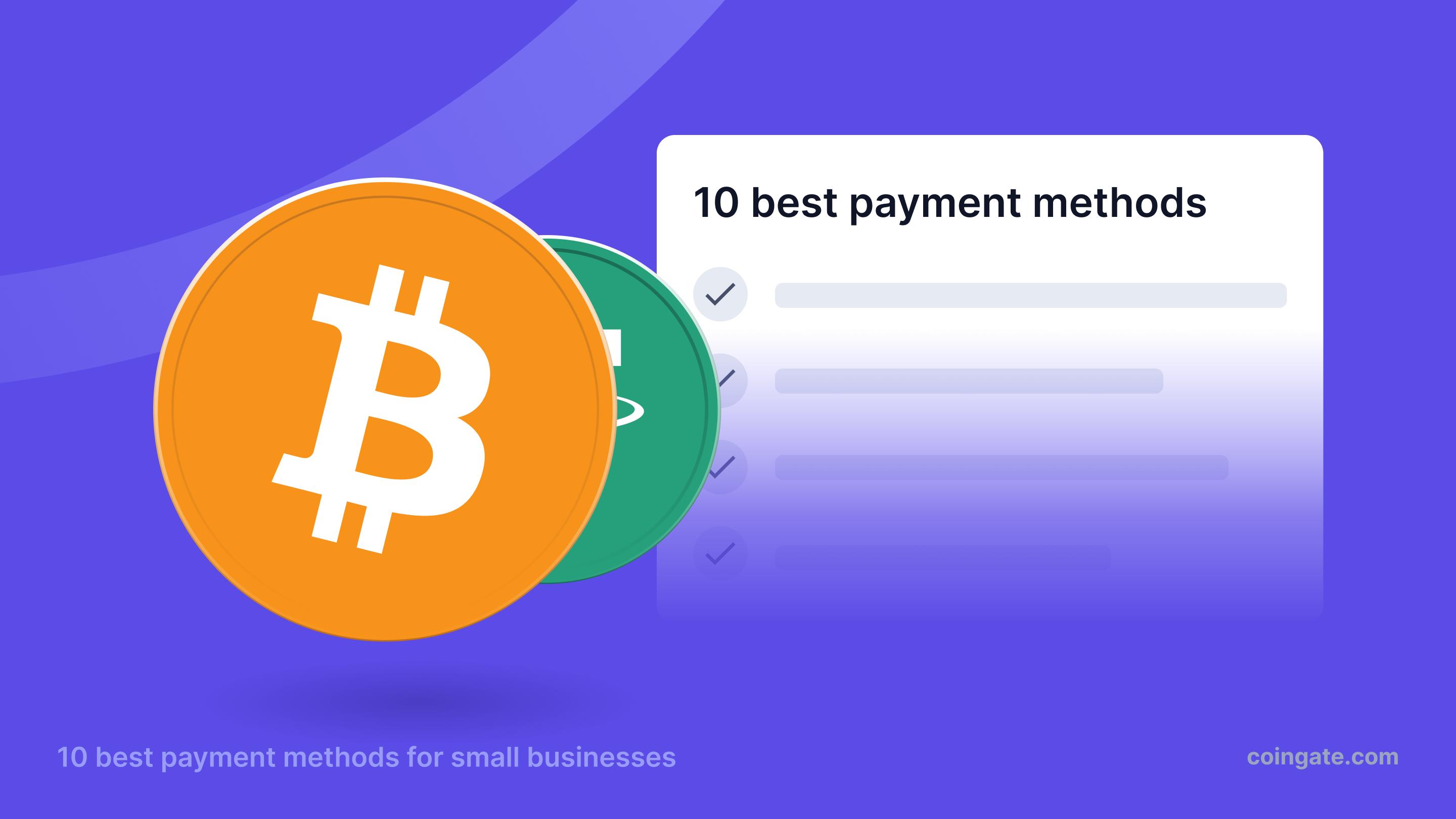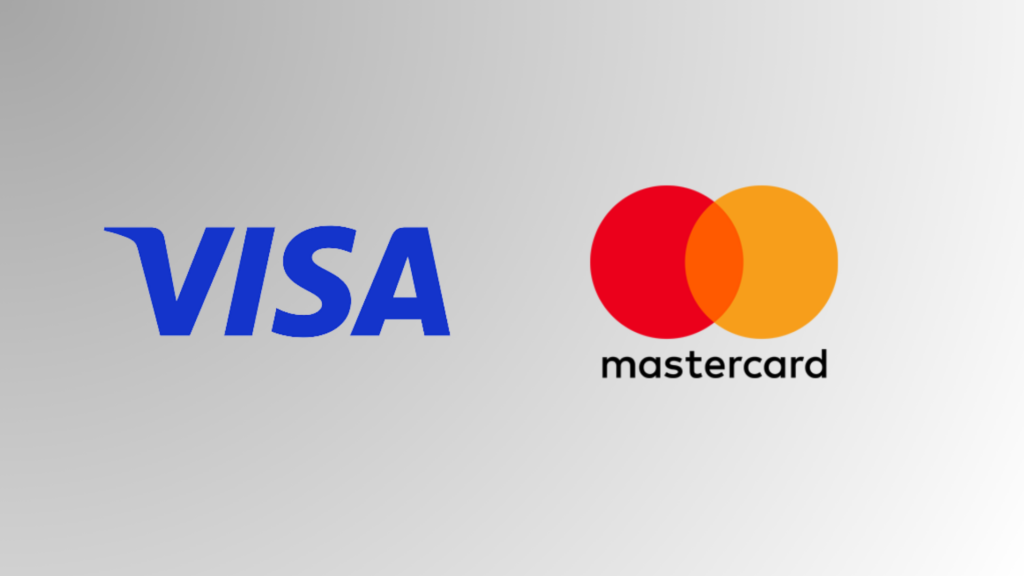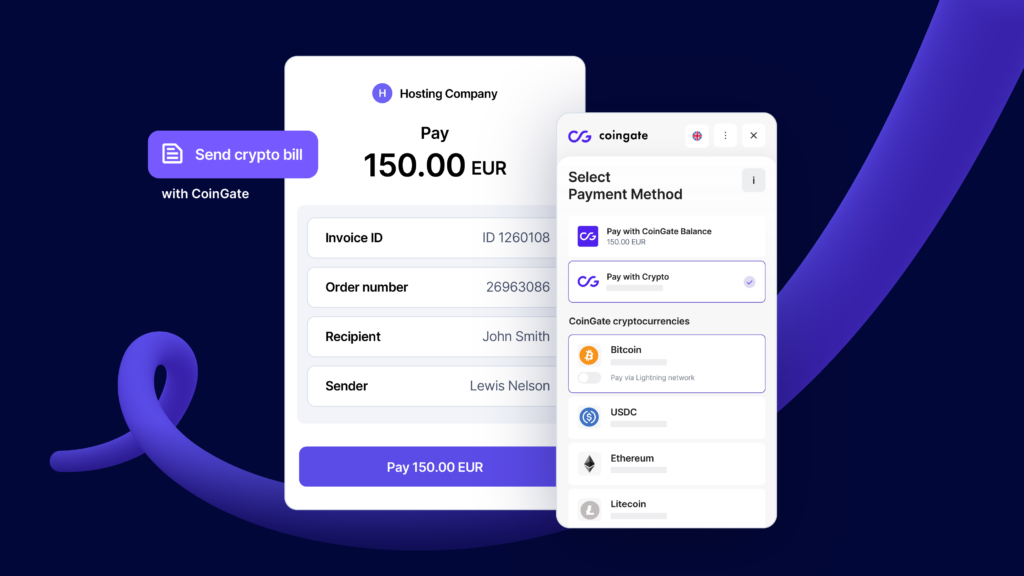
Accept crypto with CoinGate
Accept crypto with confidence using everything you need in one platform.
10 Best Payment Methods for Small Businesses in 2025

Nowadays, offering multiple payment options is essential. Customers expect choice, convenience, and speed whether they’re shopping online or in-store.
And for small businesses, the right mix of payment methods can mean more sales, fewer abandoned carts, and better customer retention.
This guide covers the top 10 payment methods small businesses should consider to stay competitive and grow.
Key Takeaways
- A diverse payment stack improves customer experience and sales.
- Mobile wallets, crypto, and BNPL are rising fast.
- Offering both online and in-person options is key.
- The right tools can cut fees, speed up transactions, and help manage cash flow.
- Services like CoinGate help you add crypto payments to your existing setup with ease.
Quick Answer: Best Payment Methods for Small Businesses
- Credit/debit cards: Still a must-have.
- Mobile wallets: Fast and secure.
- Bank transfers: Great for large payments.
- Crypto payments: Global, fast, and low-fee.
- Invoicing & payment links: Ideal for service-based or remote businesses.
The 10 Best Payment Methods for Small Businesses
1. Cryptocurrency Payments
Crypto is no longer a fringe option. More small businesses are adding Bitcoin, Ethereum, and stablecoins to their checkout for faster, cheaper, and borderless payments.
Why it matters:
- Accept payments globally, instantly
- Avoid high FX and bank fees
- Appeal to a growing, tech-savvy customer base
Businesses like MoreMins and ProxyScrape are proving it works in practice:
- MoreMins now gets 10% of all orders in crypto, with volumes doubling every year.
- ProxyScrape sees 1 in 3 payments come in crypto, with over a third of those in stablecoins.
Using platforms like CoinGate, you can accept crypto payments on multiple networks, instantly convert crypto to fiat, send crypto invoices through email, and stay compliant.
Crypto is an easy way to future-proof your payment stack and, with us, there’s no setup fee. Sign up today.
2. Credit and Debit Cards
Still the most common method, cards are trusted and expected.

Benefits:
- Instant approval
- Universal customer trust
- Easy integration with POS and eCommerce platforms
Watch out for fees (2–4%) and chargebacks. Pairing with lower-cost methods like crypto or bank transfers can help reduce your overall costs. See the comparison between credit cards and crypto payments.
3. Mobile Wallets
Apple Pay, Google Pay, and Samsung Pay are growing fast, especially among mobile-first shoppers.
Why offer them:
- Lightning-fast checkout
- Built-in fraud protection
- Seamless for in-person and online use
Just ensure your POS or platform supports them.
4. Bank Transfers / ACH
For high-value or B2B payments, bank transfers are reliable and affordable.
Advantages:
- Lower fees than card payments
- Suitable for recurring or bulk transactions
Just note: settlement takes longer, and strong encryption is a must when handling account data.
5. PayPal and Digital Wallets
PayPal, Venmo, and similar wallets remain popular, especially for online sales and freelancers.
Why they’re useful:
- Easy to set up and use
- Trusted by millions
- Great for marketplaces or social selling
Fees can add up, and account holds are a risk. Consider offering them as one of many options.
6. Buy Now, Pay Later (BNPL)
BNPL tools like Klarna, Afterpay, and Affirm are changing how people shop.
Benefits:
- Boosts conversions and order value
- Attracts shoppers without credit cards
- Quick to integrate into online stores
Just keep an eye on fees, and make sure terms are transparent for customers.
7. QR Code & Text-to-Pay
Simple, fast, and ideal for mobile-first transactions, especially for pop-ups, service providers, and local shops.
Why it works:
- No apps or cards needed
- Great for contactless, remote, or on-the-go payments
- Very low setup cost
8. Payment Gateways
Gateways are the backbone of online transactions. They securely process cards, wallets, and even crypto.
Why use them:
- Centralize your payment stack
- Handle fraud checks and security
- Integrate with major eCommerce platforms
9. Subscription Billing
Recurring billing is perfect for memberships, SaaS, and digital services.
Benefits:
- Predictable income
- Less manual work
- Improved retention
10. Invoicing & Payment Links
For remote or service-based businesses, payment links and digital invoices are powerful tools.

Why they’re great:
- Get paid via email, SMS, or chat
- Accept cards, wallets, or crypto
- No storefront or website needed
With CoinGate, you also can send crypto invoices—easy to track, secure, and they’re settled instantly. Learn more about how it works.
Why You Should Offer Multiple Payment Methods
Sticking to just one method can alienate customers. Offering a variety improves:
- Checkout conversion rates
- Customer trust and loyalty
- Global accessibility
In fact, businesses offering 4+ payment methods tend to generate more revenue and see higher repeat purchases.
In-Store vs Online: Which Payment Methods Should You Prioritize?
- In-store: Card readers, QR codes, mobile wallets
- Online: Gateways, invoicing, BNPL, crypto
- Best combo: A hybrid setup that supports both
How to Pick the Right Mix
Ask yourself:
- Do I sell in person, online, or both?
- What payment methods do my customers prefer?
- Am I dealing with local or international buyers?
Your mix should reduce fees, improve speed, and match your audience’s habits.
Manage Cash Flow Like a Pro
Even with the best payment methods, cash flow is king. Tips:
- Use a dedicated business account
- Track incoming and outgoing payments
- Use tools for accounting and invoice reminders
- Build a reserve for slow periods
The right tools help your payment methods work with—not against—your finances.
How CoinGate Helps Small Businesses
Our team at CoinGate helps small businesses accept, manage, and grow with crypto payments.
With CoinGate, you can:
- Accept 15+ cryptocurrencies
- Convert to fiat automatically
- Use API, e-commerce plugins, email invoicing, and payouts
- Reach global customers instantly, with low fees
Everything works from a single dashboard. It’s modern, secure, and flexible. Try now.
FAQs
Which online payment methods are essential for small businesses?
Credit/debit cards, mobile wallets, and invoicing tools. Crypto and BNPL add extra flexibility.
What’s the cheapest way to accept payments?
Bank transfers are low-fee. Crypto can also cut out costly intermediaries.
Are QR code payments reliable at scale?
Yes. They’re fast, low-cost, and work well for mobile-first businesses.
Can I offer in-store and online payments together?
Absolutely. Use hybrid tools like CoinGate to unify in-store and online payments.
Do payment options affect loyalty?
Yes. Customers return to businesses that support their preferred methods.
How can I future-proof my payment system?
Diversify your methods and use flexible, scalable tools like CoinGate.
Accept crypto with CoinGate
Accept crypto with confidence using everything you need in one platform.

